Accounting Theory and Practice: Analysis of Bank Lending Policies
VerifiedAdded on 2023/06/03
|6
|926
|184
Report
AI Summary
This report provides an analysis of accounting theory in the context of the National Australia Bank's (NAB) lending policies, specifically focusing on its decision to halt lending for new thermal coal projects. The report begins with a summary of the news article, followed by an exploration of relevant accounting theories such as the efficient market hypothesis, agency theory, and positive accounting theory. The analysis section applies these theories to the NAB's actions, considering factors such as institutional isomorphism and the implications of climate change. The report concludes by summarizing the key findings and discussing the broader implications of these decisions for the financial industry. The assignment fulfills the requirements of a 3101AFE Accounting Theory and Practice assignment, utilizing academic sources to support its claims and adhering to the specified structure and word count.
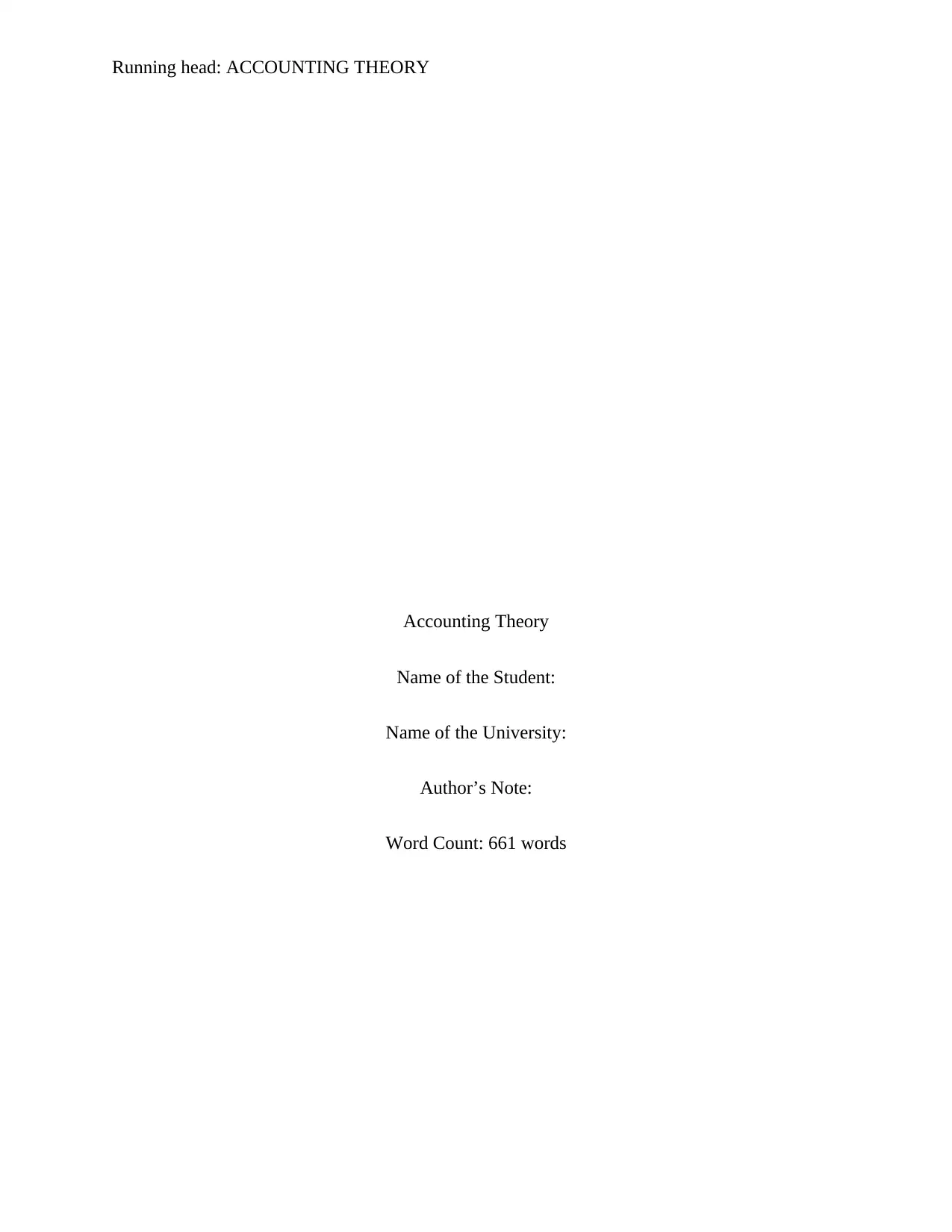
Running head: ACCOUNTING THEORY
Accounting Theory
Name of the Student:
Name of the University:
Author’s Note:
Word Count: 661 words
Accounting Theory
Name of the Student:
Name of the University:
Author’s Note:
Word Count: 661 words
Paraphrase This Document
Need a fresh take? Get an instant paraphrase of this document with our AI Paraphraser
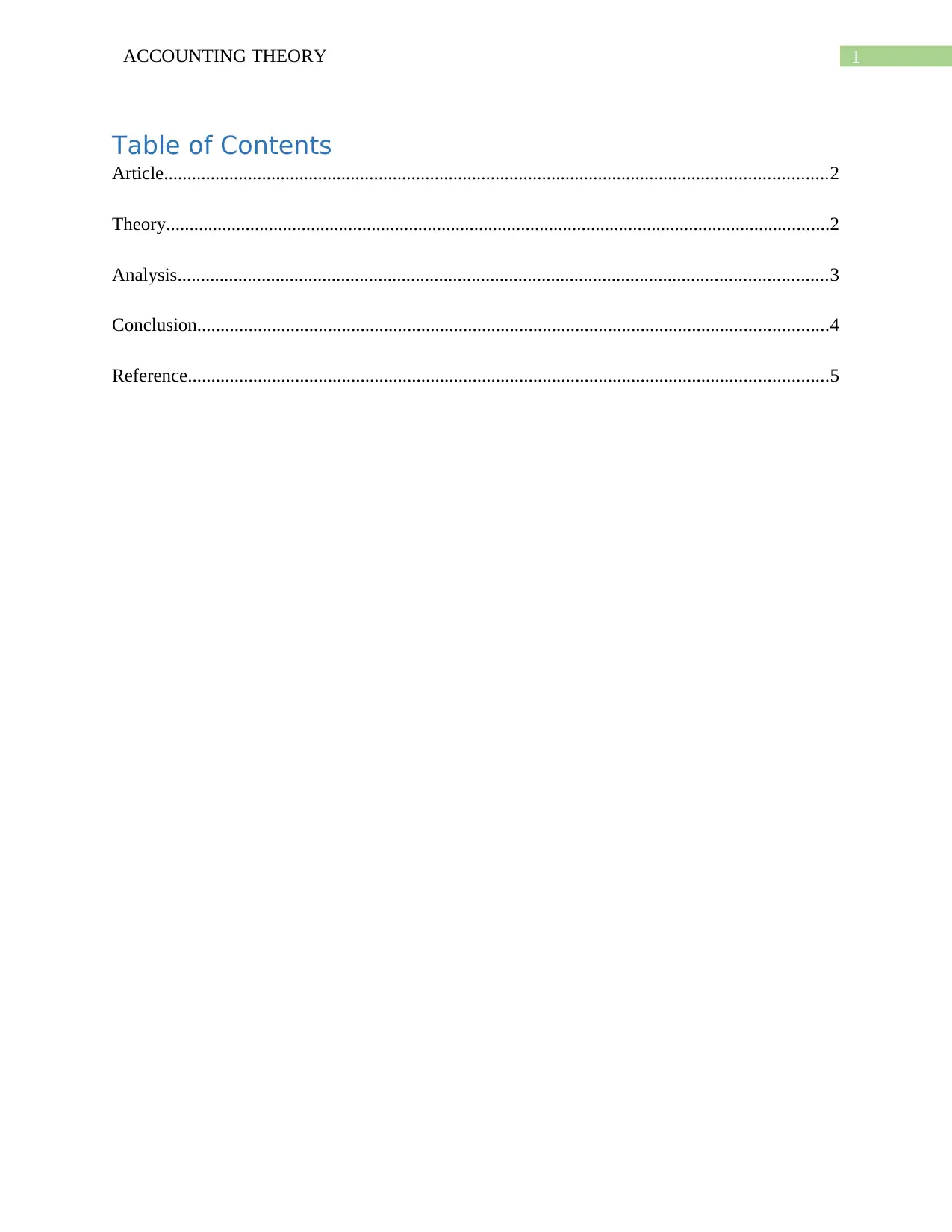
1ACCOUNTING THEORY
Table of Contents
Article..............................................................................................................................................2
Theory..............................................................................................................................................2
Analysis...........................................................................................................................................3
Conclusion.......................................................................................................................................4
Reference.........................................................................................................................................5
Table of Contents
Article..............................................................................................................................................2
Theory..............................................................................................................................................2
Analysis...........................................................................................................................................3
Conclusion.......................................................................................................................................4
Reference.........................................................................................................................................5
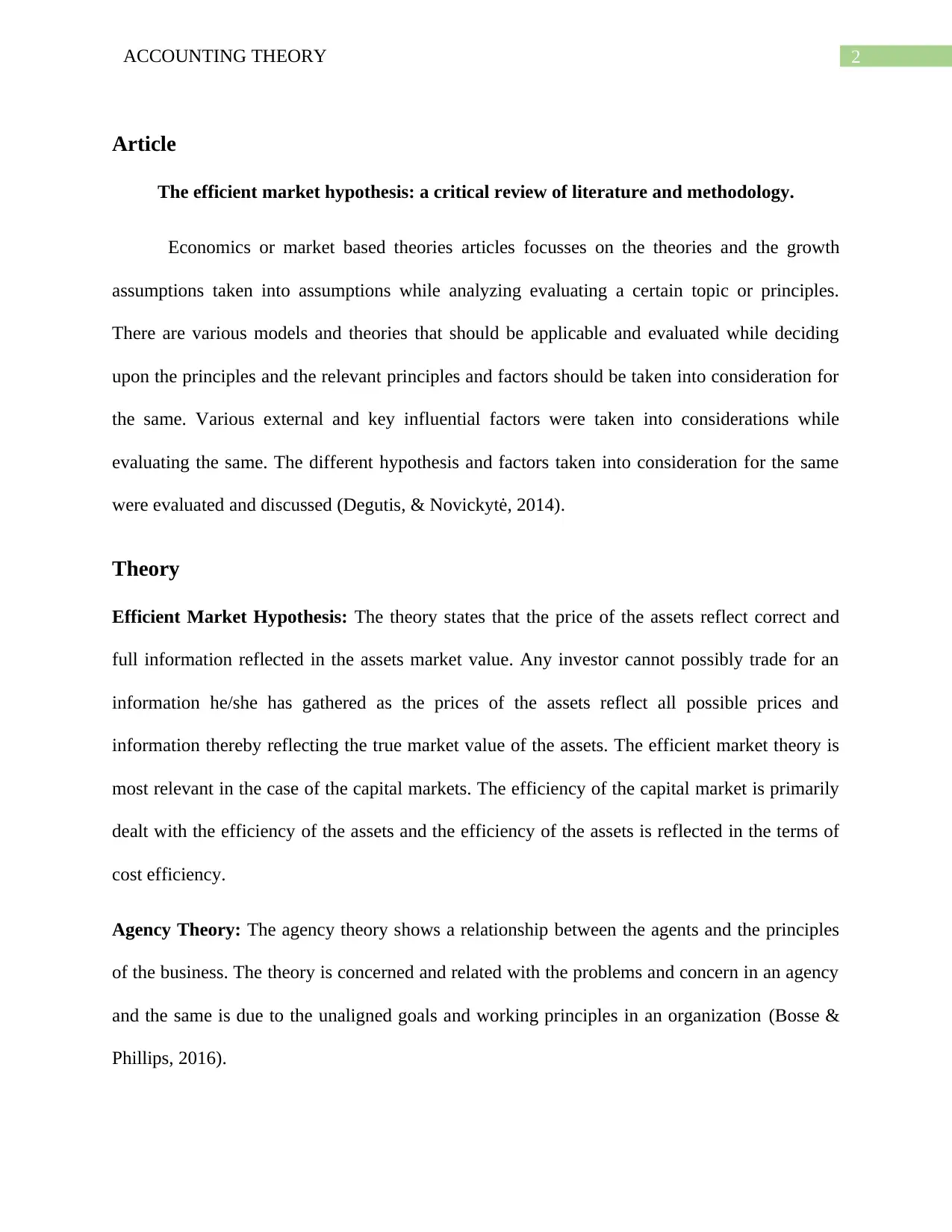
2ACCOUNTING THEORY
Article
The efficient market hypothesis: a critical review of literature and methodology.
Economics or market based theories articles focusses on the theories and the growth
assumptions taken into assumptions while analyzing evaluating a certain topic or principles.
There are various models and theories that should be applicable and evaluated while deciding
upon the principles and the relevant principles and factors should be taken into consideration for
the same. Various external and key influential factors were taken into considerations while
evaluating the same. The different hypothesis and factors taken into consideration for the same
were evaluated and discussed (Degutis, & Novickytė, 2014).
Theory
Efficient Market Hypothesis: The theory states that the price of the assets reflect correct and
full information reflected in the assets market value. Any investor cannot possibly trade for an
information he/she has gathered as the prices of the assets reflect all possible prices and
information thereby reflecting the true market value of the assets. The efficient market theory is
most relevant in the case of the capital markets. The efficiency of the capital market is primarily
dealt with the efficiency of the assets and the efficiency of the assets is reflected in the terms of
cost efficiency.
Agency Theory: The agency theory shows a relationship between the agents and the principles
of the business. The theory is concerned and related with the problems and concern in an agency
and the same is due to the unaligned goals and working principles in an organization (Bosse &
Phillips, 2016).
Article
The efficient market hypothesis: a critical review of literature and methodology.
Economics or market based theories articles focusses on the theories and the growth
assumptions taken into assumptions while analyzing evaluating a certain topic or principles.
There are various models and theories that should be applicable and evaluated while deciding
upon the principles and the relevant principles and factors should be taken into consideration for
the same. Various external and key influential factors were taken into considerations while
evaluating the same. The different hypothesis and factors taken into consideration for the same
were evaluated and discussed (Degutis, & Novickytė, 2014).
Theory
Efficient Market Hypothesis: The theory states that the price of the assets reflect correct and
full information reflected in the assets market value. Any investor cannot possibly trade for an
information he/she has gathered as the prices of the assets reflect all possible prices and
information thereby reflecting the true market value of the assets. The efficient market theory is
most relevant in the case of the capital markets. The efficiency of the capital market is primarily
dealt with the efficiency of the assets and the efficiency of the assets is reflected in the terms of
cost efficiency.
Agency Theory: The agency theory shows a relationship between the agents and the principles
of the business. The theory is concerned and related with the problems and concern in an agency
and the same is due to the unaligned goals and working principles in an organization (Bosse &
Phillips, 2016).
⊘ This is a preview!⊘
Do you want full access?
Subscribe today to unlock all pages.

Trusted by 1+ million students worldwide
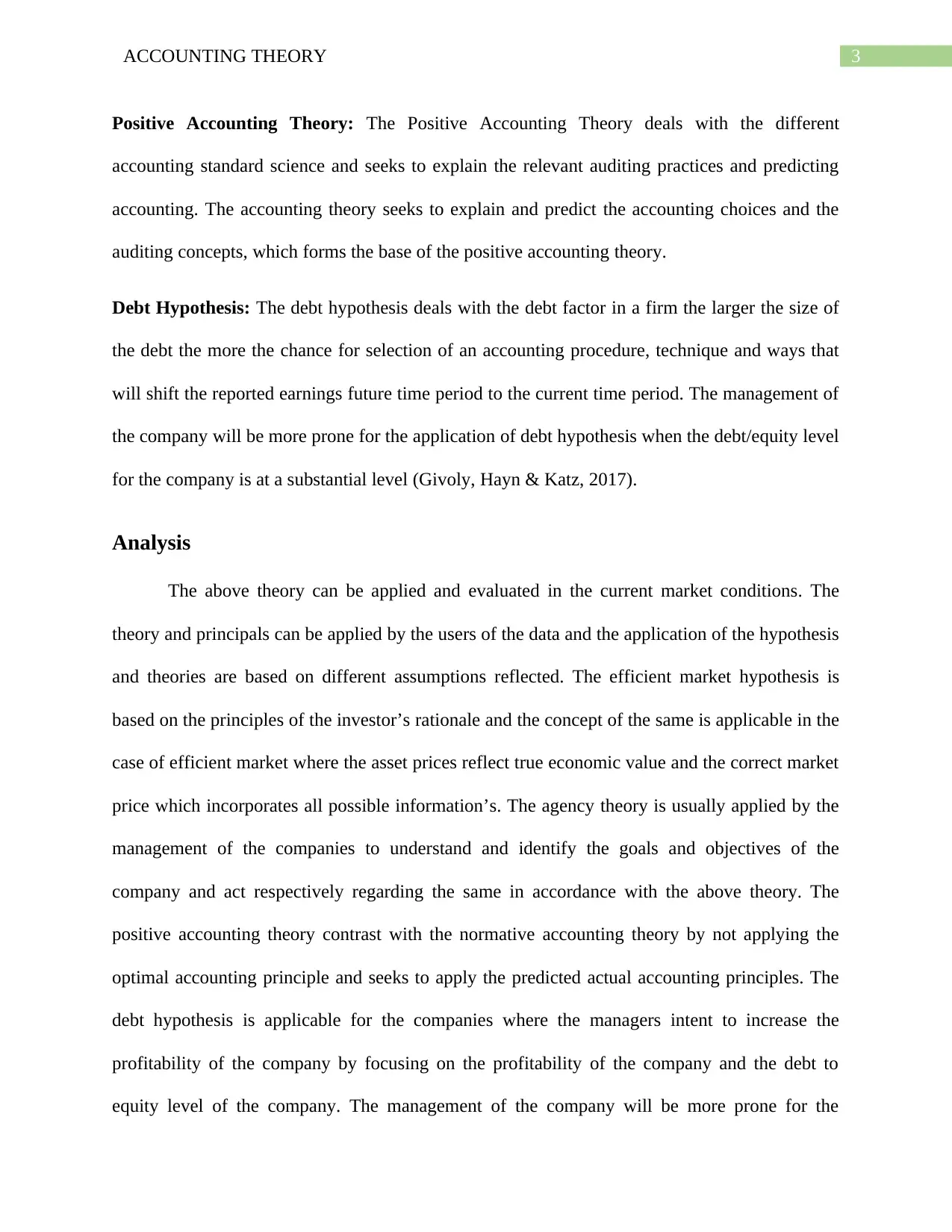
3ACCOUNTING THEORY
Positive Accounting Theory: The Positive Accounting Theory deals with the different
accounting standard science and seeks to explain the relevant auditing practices and predicting
accounting. The accounting theory seeks to explain and predict the accounting choices and the
auditing concepts, which forms the base of the positive accounting theory.
Debt Hypothesis: The debt hypothesis deals with the debt factor in a firm the larger the size of
the debt the more the chance for selection of an accounting procedure, technique and ways that
will shift the reported earnings future time period to the current time period. The management of
the company will be more prone for the application of debt hypothesis when the debt/equity level
for the company is at a substantial level (Givoly, Hayn & Katz, 2017).
Analysis
The above theory can be applied and evaluated in the current market conditions. The
theory and principals can be applied by the users of the data and the application of the hypothesis
and theories are based on different assumptions reflected. The efficient market hypothesis is
based on the principles of the investor’s rationale and the concept of the same is applicable in the
case of efficient market where the asset prices reflect true economic value and the correct market
price which incorporates all possible information’s. The agency theory is usually applied by the
management of the companies to understand and identify the goals and objectives of the
company and act respectively regarding the same in accordance with the above theory. The
positive accounting theory contrast with the normative accounting theory by not applying the
optimal accounting principle and seeks to apply the predicted actual accounting principles. The
debt hypothesis is applicable for the companies where the managers intent to increase the
profitability of the company by focusing on the profitability of the company and the debt to
equity level of the company. The management of the company will be more prone for the
Positive Accounting Theory: The Positive Accounting Theory deals with the different
accounting standard science and seeks to explain the relevant auditing practices and predicting
accounting. The accounting theory seeks to explain and predict the accounting choices and the
auditing concepts, which forms the base of the positive accounting theory.
Debt Hypothesis: The debt hypothesis deals with the debt factor in a firm the larger the size of
the debt the more the chance for selection of an accounting procedure, technique and ways that
will shift the reported earnings future time period to the current time period. The management of
the company will be more prone for the application of debt hypothesis when the debt/equity level
for the company is at a substantial level (Givoly, Hayn & Katz, 2017).
Analysis
The above theory can be applied and evaluated in the current market conditions. The
theory and principals can be applied by the users of the data and the application of the hypothesis
and theories are based on different assumptions reflected. The efficient market hypothesis is
based on the principles of the investor’s rationale and the concept of the same is applicable in the
case of efficient market where the asset prices reflect true economic value and the correct market
price which incorporates all possible information’s. The agency theory is usually applied by the
management of the companies to understand and identify the goals and objectives of the
company and act respectively regarding the same in accordance with the above theory. The
positive accounting theory contrast with the normative accounting theory by not applying the
optimal accounting principle and seeks to apply the predicted actual accounting principles. The
debt hypothesis is applicable for the companies where the managers intent to increase the
profitability of the company by focusing on the profitability of the company and the debt to
equity level of the company. The management of the company will be more prone for the
Paraphrase This Document
Need a fresh take? Get an instant paraphrase of this document with our AI Paraphraser
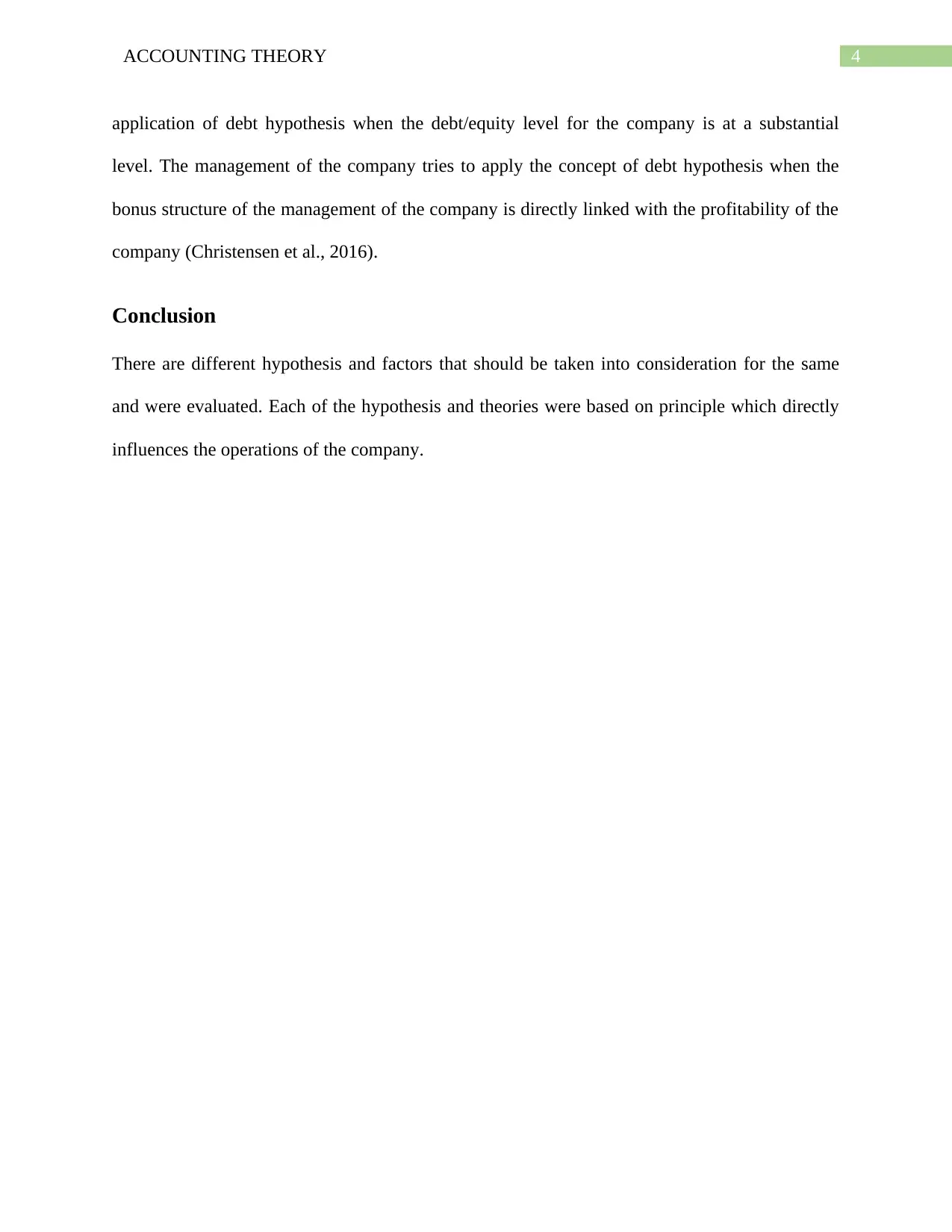
4ACCOUNTING THEORY
application of debt hypothesis when the debt/equity level for the company is at a substantial
level. The management of the company tries to apply the concept of debt hypothesis when the
bonus structure of the management of the company is directly linked with the profitability of the
company (Christensen et al., 2016).
Conclusion
There are different hypothesis and factors that should be taken into consideration for the same
and were evaluated. Each of the hypothesis and theories were based on principle which directly
influences the operations of the company.
application of debt hypothesis when the debt/equity level for the company is at a substantial
level. The management of the company tries to apply the concept of debt hypothesis when the
bonus structure of the management of the company is directly linked with the profitability of the
company (Christensen et al., 2016).
Conclusion
There are different hypothesis and factors that should be taken into consideration for the same
and were evaluated. Each of the hypothesis and theories were based on principle which directly
influences the operations of the company.
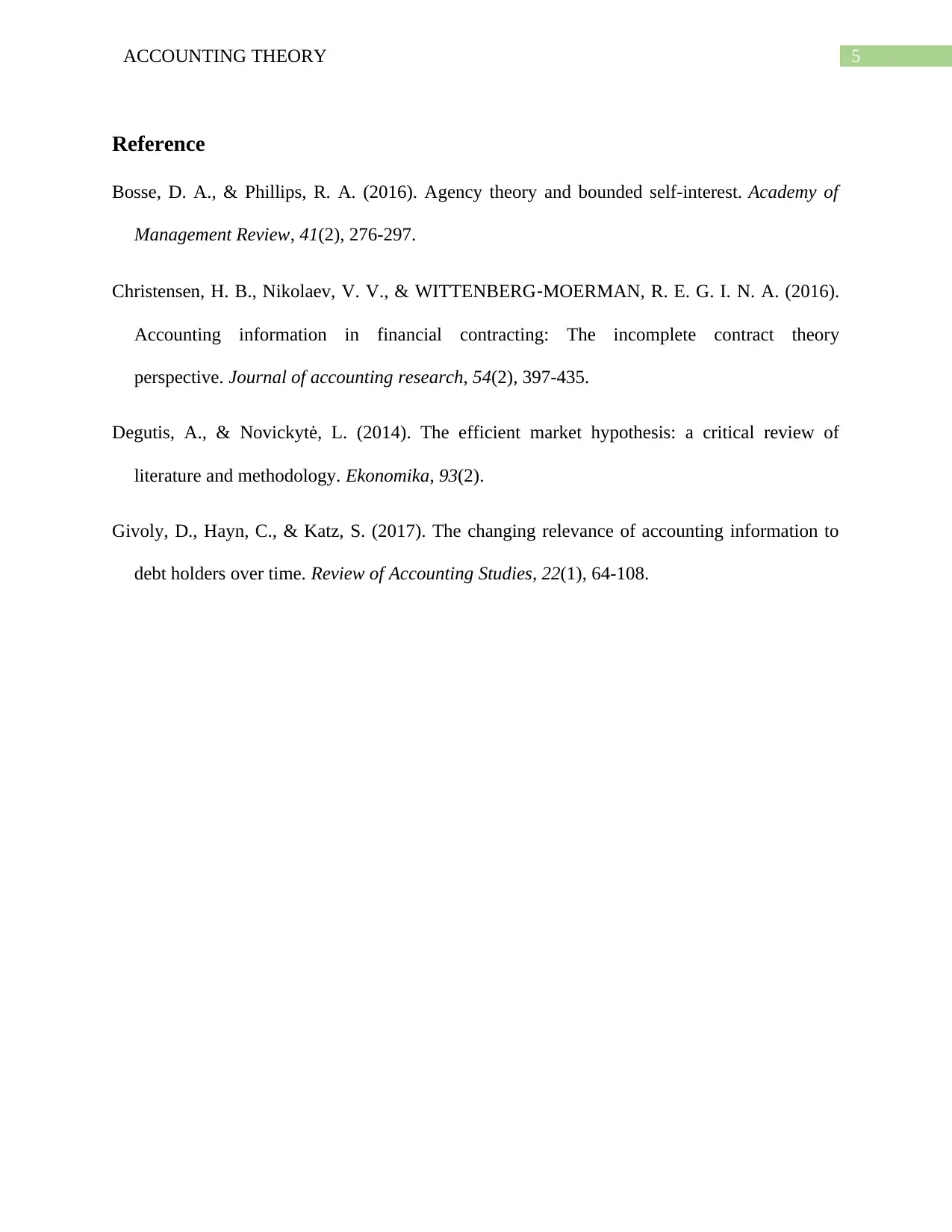
5ACCOUNTING THEORY
Reference
Bosse, D. A., & Phillips, R. A. (2016). Agency theory and bounded self-interest. Academy of
Management Review, 41(2), 276-297.
Christensen, H. B., Nikolaev, V. V., & WITTENBERG‐MOERMAN, R. E. G. I. N. A. (2016).
Accounting information in financial contracting: The incomplete contract theory
perspective. Journal of accounting research, 54(2), 397-435.
Degutis, A., & Novickytė, L. (2014). The efficient market hypothesis: a critical review of
literature and methodology. Ekonomika, 93(2).
Givoly, D., Hayn, C., & Katz, S. (2017). The changing relevance of accounting information to
debt holders over time. Review of Accounting Studies, 22(1), 64-108.
Reference
Bosse, D. A., & Phillips, R. A. (2016). Agency theory and bounded self-interest. Academy of
Management Review, 41(2), 276-297.
Christensen, H. B., Nikolaev, V. V., & WITTENBERG‐MOERMAN, R. E. G. I. N. A. (2016).
Accounting information in financial contracting: The incomplete contract theory
perspective. Journal of accounting research, 54(2), 397-435.
Degutis, A., & Novickytė, L. (2014). The efficient market hypothesis: a critical review of
literature and methodology. Ekonomika, 93(2).
Givoly, D., Hayn, C., & Katz, S. (2017). The changing relevance of accounting information to
debt holders over time. Review of Accounting Studies, 22(1), 64-108.
⊘ This is a preview!⊘
Do you want full access?
Subscribe today to unlock all pages.

Trusted by 1+ million students worldwide
1 out of 6
Related Documents
Your All-in-One AI-Powered Toolkit for Academic Success.
+13062052269
info@desklib.com
Available 24*7 on WhatsApp / Email
![[object Object]](/_next/static/media/star-bottom.7253800d.svg)
Unlock your academic potential
Copyright © 2020–2026 A2Z Services. All Rights Reserved. Developed and managed by ZUCOL.





